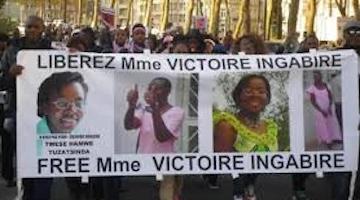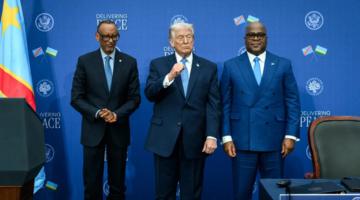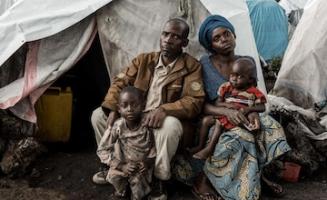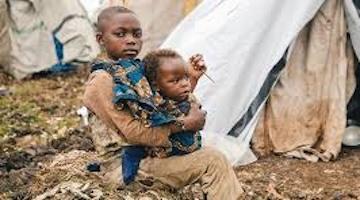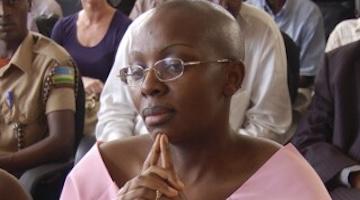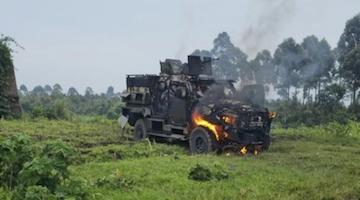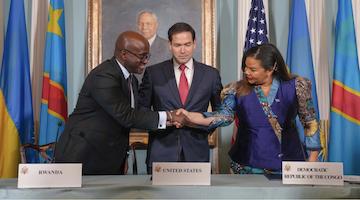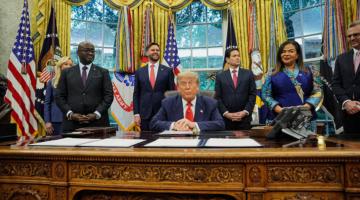Campbell interrogates the recent DRC-Rwanda peace accord brokered in the US which he terms fraudulent; and poses the question: can the US and Qatar support peace in Africa amidst the militarization of the continent?
Originally published in Pambazuka News.
Introduction
The Democratic Republic of the Congo is reportedly the richest country in minerals on the planet earth. According to the United Nations Environment Programme (UNEP), it is estimated that the Democratic Republic of the Congo (DRC) holds natural resources valued at approximately US$24 trillion.[1] The US$24 trillion estimate includes:
-
Cobalt: DRC controls about 70% of global reserves, essential for batteries and electric vehicles.
-
Coltan (Tantalum): Also holds 70% of global reserves, used in electronics.
-
Copper: Around 10% of global reserves, with high ore grades.
-
Diamonds: Over 30% of global reserves, especially in Mbuji-Mayi.
-
Gold: High-purity deposits in regions like Ituri.
-
Lithium, Tin, Tungsten, Zinc, Rare Earth Elements, and Manganese: All present in significant quantities
And yet, the more than 110 million Congolese people are among the poorest in the world. Their impoverishment is directly related to the war situations that have enveloped this country over the past 140 years. Militarism as a mode of politics dominated society since the genocidal political relations of the colonial period. The United States continued the Belgian traditions by deploying the United Nations and ‘peace initiatives’ for the advancement of the US’s strategic interests. The U.S. is permanently interested in dominating access to the mineral resources of Africa and is working overtime to secure significant mineral rights in the DRC, particularly for cobalt, coltan, lithium, copper, and gold. Representing war as peace became an industry for intellectuals who supported the US interests in Africa. There was an entire academic industry built around the denigration of the Congolese peoples and upholding the United States as the promoter of peace, good governance and human rights.
Rwanda is a small landlocked agricultural state with a population of about 14 million persons seeking to dominate the peoples and resources of the Congo. For the past twenty-six years, the government of Rwanda has been able to plunder the Congo with the assistance of western capitalist countries. Most recently, the army of Rwanda created a front group called M23. Military, political and diplomatic forces in the USA, France, Britain and the Gulf States supported Rwanda in its war against the peoples of Africa and the Congo. It is assessed by peace activists that wars in the DRC and the Great Lakes region have been the deadliest in the world over the past thirty years.
The United States had become involved in direct support to oppression in the Congo during the era of Belgian colonialism. In the second imperialist war, 1939-1945, the US entrenched its interest in procuring uranium from the Katanga region of the DRC to produce the first atomic weapon in the Manhattan project.[2] After spearheading and anchoring the destabilization of the Congolese independence project and the assassination of the first democratically elected Prime Minister, Patrice Lumumba, the United States propped up the dictatorship of Mobutu Sese Seko for more than 35 years. In this destructive process, the most expensive United Nations Peace Keeping operation was generated to legitimize the actions of NATO and the USA in the Congo. The duplicity and treachery of the US in that peace process claimed the life of the Secretary General of the United Nations. Up to today, the US has refused to release its files on the role of the US in the death of UN Secretary General Dag Hammarskjold.[3]
When militarism as a mode of politics and genocidal politics exploded in 1994, the USA pressured the United Nations to withdraw from Rwanda, providing clear pathways for the genocide and war that engulfed all of Eastern Africa. After 30 years of war with the changed international situation, the United States had outsourced the military domination of Africa to France, the EU and Britain. However, in the period of rapid technological change when the mineral resources of the DRC were considered strategic for the United States, the US rolled out the Minerals Security Partnership (MSP). The goal of the MSP is to accelerate the development of diverse and sustainable critical energy minerals under the control of US corporations. Of the dozen or so minerals listed above, DRC controls about 70 per cent of global reserves, essential for batteries and electric vehicles. China is significantly ahead of the United States in electric vehicle (EV) production and adoption as of 2025, and the gap continues to widen. The quest for Congo’s cobalt, which is vital for electric vehicles and the worldwide push against climate change ensures that the war situations in the DRC and the Great Lakes region are intricately linked to the procurement of minerals such as cobalt and coltan.
Force in acquiring mineral rights and super exploitation of Congolese miners require militarization of the state and society involving military entrepreneurs (called warlords by academics) from Rwanda, Burundi and Uganda. The open support of the government of Rwanda for plundering the resources of the DRC had become so blatant that the very same forces that propped up the military capabilities of Rwanda were now calling for Rwanda to sign a peace agreement with the DRC. This background provides the context of the ‘peace agreement’ signed in Washington, D.C. in June 2025 between Rwanda and the Democratic Republic of Congo (DRC). The deal, brokered by the U.S. and Qatar, includes provisions for the withdrawal of Rwandan troops from eastern DRC within 90 days and for the Congolese government to cease support for the Forces démocratiques de libération du Rwanda FDLR militia. The agreement also emphasizes respect for territorial integrity, peaceful dispute resolution, and the prohibition of hostile acts between the two nations. In this commentary we analyze this peace agreement in the context of the widening militarization of Africa by the United States and its allies. This contribution brings to the table the historical record of the USA and militarization of Africa and asks the question whether the President of the United States or the Emir of Qatar can be supporters of peace in Africa. We determine that this is a fraudulent peace process. The conclusion raises the question of sustainable peace and reconstruction. We hold to the position of Patrice Lumumba and Frantz Fanon that peace and reconstruction in the Congo is bound up with the unification and reconstruction of Africa.
The United States brokering peace in the Democratic Republic of the Congo?
The DRC–Rwanda peace agreement was signed on 27 June 2025, in Washington, D.C., during the same week that the United States bombed Iranian nuclear facilities. Known as the Washington Accord, the peace treaty was signed by the foreign ministers of the Democratic Republic of the Congo and Rwanda, with mediation by the United States and Qatar in the presence of President Donald J. Trump. The agreement called for:
-
Withdrawal of Rwandan troops from eastern DRC within 90 days.
-
The DRC to end support for the FDLR militia.
-
A framework for regional economic integration
The International media from all parts of the world (New York Times, Al Jazeera, Economist, Daily Telegraph, Globe and Mail (Toronto), Daily Nation (Nairobi), Guardian (UK), and Radio France International) carried favorable commentary on the positive role played by the United States. However, the nature of these mainstream press reports are to evade the burning issues of the USA undermining peace and reconstruction in Africa.[4]
The key elements of the Peace Deal include: Peaceful Dispute Resolution; Cessation of Support for Armed Groups; Respect for Territorial Integrity; Withdrawal of Troops; Economic Integration and Security Coordination. But one may dig deeper after going through the details of the agreement to see that the process and the deal itself are entirely fraudulent and deceptive. How could the United States and Qatar emerge as peace makers in Africa? This question is sharpened by reports that Erik Prince of Blackwater infamy has been a key negotiator in preparation for these accords. To penetrate these issues, we look at Erik Prince, Qatar and the United States.
Erik Prince
The media reports credit Erik Prince as one of the main drivers of the DRC-Rwanda 2025 agreement. Erik Prince is from a multi-millionaire family in the United States with historic ties to conservative Christian political movements. After interning in the White House under George W. Bush, Prince founded Blackwater in 1997, turning it into the largest US private military contractor in the USA. This was one of the most lucrative war businesses in the USA, especially after the moral victories of the peace movement in Vietnam. “During U.S. military operations in Iraq and Afghanistan between 2001 and 2020, contractors frequently accounted for 50% or more of the total DOD presence in the country.”[5]
Blackwater remained as one of the top providers of military personnel for war until the 2007 Nisour Square massacre in Baghdad – when Blackwater operatives killed 17 civilians. Jeremy Scahill (2011) in Blackwater: The Rise of the World's Most Powerful Mercenary Army documented the integration of private military contractors into the US military and intelligence operations during the War on Terror. Sean McFate from within the US military academic infrastructure added more information for the training colleges of the military in the book, Mercenaries and War: Understanding Private Armies Today.[6]
The integration of the overt mercenary types received bad publicity after several employees were later convicted for the Nisour square killings, to the point where Blackwater was sold in 2010. Exposed as a functionary of the Central Intelligence Agency, the name of the company Blackwater was changed to Xe, then Academi. Prince moved to the UAE during the Obama administration, where he helped set up a foreign mercenary force and launched Reflex Responses, a private security company. Erik Prince expanded the military contracting business across West Asia and Africa. As a member of the conservative capitalist forces in the USA, Prince’s sister was named the Secretary of Education under Donald Trump. The employees of Blackwater were also pardoned under President Donald Trump.
Private Military and Security Companies (PMSCs) exploded during the wars in Afghanistan and Iraq and served as the frontline soldiers for the US Africa Command. [7]
“Prince later founded Frontier Services Group (FSG) in 2014, a logistics firm backed by Chinese state investment. FSG operated across Africa, including in the DRC, supporting Chinese commercial interests. In 2023, it was sanctioned by the US for allegedly helping train Chinese military pilots, a charge the company denied.
Despite sanctions and scrutiny, Prince has remained active in Africa, often focusing on securing extractive industries in volatile areas. His re-entry into the DRC underscores the continued appeal – and risk – of outsourcing state functions to private operators in fragile states awash with critical minerals.”[8]
Two important points emerge from this quotation. The first is the integration of Chinese capitalists and the Chinese state into this network of militarists and plunderers in Africa. The second is that these elements survive with war as a business enterprise in Africa.[9]
According to the Africa Report, companies controlled by Erik Prince began operating in the DRC, primarily in logistics and trucking, with ambitions to enter the minerals sector. The “UN accused him of planning to deploy thousands of Latin American mercenaries to North Kivu to protect mines and push back rebels – an operation that ultimately fizzled, but raised alarms over arms embargo violations and potential corruption.”[10]
These elements in this world of war as a business are not shy to claim the Pan African mantle. Erik Prince claims that the Frontier Services Group (FSG) is a Pan African Logistics provider. This is how the Stanford Business School describes FSG,
“Headquartered in Nairobi, Kenya, the company employed more than 340 staff in its head office and regional subsidiaries in Hong Kong, Beijing, Dubai, and Malta. In addition to traditional logistics solutions like transporting personnel, materials, supplies, and humanitarian aid, FSG provided civil engineering and support services such as in-house construction, facilities management, and workforce accommodation. Its mission was to build and maintain the infrastructure, installations and platforms its client organizations required to operate in Africa.”[11]
From Nairobi, Kenya, the military contracting enterprise is within easy reach of the military entrepreneurs from Kenya, Uganda, Rwanda, and the DRC. It is not surprising to find leading politicians such as the ex-head of DR Congo's electoral commission finding their way to Nairobi.[12]
Erik Prince was active in the MAGA world in 2024 and in an overt appeal to the white supremacists globally, Prince called for the recolonization of Africa, stating:
“If so many of these countries around the world are incapable of governing themselves, it’s time for us to just put the imperial hat back on, to say, we’re going to govern those countries if you’re incapable of governing yourselves, because enough is enough, we’re done being invaded. You can say that about pretty much all of Africa, they’re incapable of governing themselves and benefitting their citizens because the governments there are all about looting and pillaging and lining their pockets and going shopping in Paris.”[13]
It is this mantra of Africa's incompetence expressed as “they are incapable of governing themselves” that appealed to the Trump administration and spurred cooperation between Erik Prince, Qatar and the Trump administration.[14] Readers should note that this fraudulent Peace agreement was then the seventh signed by leaders of the DRC since its independence. The negative history of the United Nations in the DRC since its intervention to save Belgium and oversee the destruction of the Lumumba government is well documented.[15]
The current wars in the DRC are considered among the 11 or 12 major wars since the removal of the Belgians in 1960.[16] These wars identified by even western journalistic sources as major military confrontations have involved the governments of Rwanda, Uganda and Burundi since the expanded renewed warfare in 1998 after the removal of Mobutu Sese Seko (the liberation war of 1996-1997 with the Alliance of Democratic Forces for Liberation (AFDL). Expanded looting of the mineral resources of the Congo in the period since 1997 brought states and individuals into the looting of minerals in the Congo.[17] What the UN reports on the plunder of the Congo revealed was that none of the looting operations could be carried out without the collaboration and financial backing of Western companies that deal in rare metals, gems and other resources. The billions of dollars involved required military organized forces and states with air capabilities to carry cargo from the region. Air transport, arms deals, laundering minerals and other transactions are carried out through sophisticated supply chains with air transport capabilities.
Qatar
The media reports are that the peace negotiations of 2025 have been brokered by the leaders of Qatar. Qatar is a tiny state located on the Qatar Peninsula in West Asia. The economy of Qatar is one of the highest in the world based on GDP per capita, ranking generally among the top ten richest countries on world rankings. This tiny statelet on the Persian Gulf is known for its vast natural gas reserves, which have propelled it to become one of the states with an international airline in the cargo business. Qatar Airways Cargo is recognized as a leading international air cargo carrier in the business of international air transport. In a moment when Boeing aircraft company was facing international criticisms, Qatar Airways placed a historic order for up to 210 Boeing widebody airplanes, including one hundred and thirty 787 Dreamliners and thirty 777-9s, with options for an additional fifty aircrafts.[18] This is the largest widebody aircraft order in Boeing's history and Qatar Airways' largest ever order. It is the same state that gifted President Trump with a US $400 million dollar aircraft.[19] Since the devaluation of the dollar in 1971 and the 1973 war in West Asia, the oil producing states of the Gulf recycled their wealth through the capital markets of the United States and US corporations including private military corporations.[20] From real estate and tech to renewable energy and infrastructure, Gulf sovereign wealth funds and private investors are pouring billions into American markets.[21]
At the same time as recycling wealth by investing in US securities, Qatar has been hoarding gold. Hence, its intense interest in Africa, especially countries that produce gold. The political leadership is especially nervous given its tenuous relationship with Saudi Arabia and the United Arab Emirates. In 2017, Saudi Arabia, UAE and Bahrain blockaded Qatar. This blockade did not disrupt political and economic life in so far as Qatar serves as the largest base for the United States Central Command in the West Asia region. The name of the base is Al Udeid and it hosts thousands of service members to protect the ruling elements of this state where 12 per cent of the so-called Arab population exploit 88 per cent of the population that does not have citizenship rights. In the same year that the United States started to expand the Al Udeid base, the political leaders of Qatar established a news network called Al Jazeera to sanitize US and Israeli information in the region. At the same time, the leadership of Qatar presented itself as a sympathetic force for the Palestinian peoples. One of the reasons given for the 2017 blockade by Saudi Arabia and the UAE was the call for Qatar to shut down Al Jazeera and its affiliate stations, as well as stop funding a number of information platforms that served the interests of the Emir of Qatar.
Qatar has deployed its vast wealth to create mischief in Africa and support religious extremists. In the context of Libya, when the Libyan leader, Col Gaddafi embraced the idea of mobilizing African resources to speed the monetary integration of Africa, Qatar worked hand in glove with the NATO forces to destroy Libya. In my book, Global NATO and the catastrophic failure in Libya there are the details of how Qatar actively supported the Libyan opposition against Muammar Gaddafi, including providing military aid, training, and political support for Islamists. In the final assault on Tripoli and the execution of Gaddafi, Qatar mobilized over 5000 troops to support the NATO destruction of peace in Libya. Qatar also became one of the first countries to recognize the National Transitional Council (NTC) and actively worked to market Libyan oil controlled by anti-Gaddafi forces.
Two of the countries that are linked to looting resources in the DRC, Rwanda, and Kenya are the top two ‘partners’ of Qatar in Africa. Despite its support for military factions in Somalia and Libya, Qatar presented itself as a peacemaker in the DRC. After the Lusaka Peace agreement of 1999 and the deployment of MONUSCO,[22] war situations intensified with the most recent escalation involving the 2024 takeover of Goma and Bukavu by M-23 forces. In a recent internal education session of the Global Pan African Movement, Dr. Theogene Rudasingwa, former assistant to President Paul Kagame, and former secretary General of the Rwandan Patriotic Front (RPF) explained how Rwanda and Kagame deployed massive financial resources to undermine the South African Development Community (SADC) and East African military missions in the Congo.
“Rudasingwa had noted,
“With financial aid and diplomatic cover, Western powers have emboldened Kagame’s aggressive expansionism, fueling massacres, mass displacement, and the systematic looting of Congo’s vast resources. Yet now, in a bitter twist of irony, the same Western governments that once shielded him are imposing mild sanctions or merely threatening to do so in response to his relentless destabilization of the DRC.”[23]
Militarism, war, and displacement in the Democratic Republic of the Congo persisted into 2025, marked by ferocious battles between Rwandan-backed M23 forces and the Congolese army. Mediation efforts led by Angola reached a standstill, while the compromised initiatives put forward by Kenyan President William Ruto faced criticism from the Congolese President. Enter Qatar as a mediator when Ruto’s double dealing was exposed.
Though Qatar is not yet a full-fledged partner of the Minerals Security Partnership (mentioned above), it invested nearly US $200m into new projects in mining nickel, rare earths, lithium, and vanadium projects globally.[24] Qatar came forward in 2025 after the M-23 over ran Goma and Bukavu to represent itself as a mediator between Rwanda and DRC hosting meetings between the two Presidents in Doha. The signing of the ‘peace agreement’ in Washington in June 2025 was the outcome of the ‘mediating efforts’ of Qatar.
The United States and the fraudulent Peace agreement in the Democratic Republic of the Congo.
A fraudulent peace agreement is a peace agreement that is based on deception or misrepresentation, and where one or more parties enter it under false pretenses, intending to deceive the other party or parties. Essentially, it's a peace deal where the terms or the process of reaching the agreement are tainted by fraud. The history of peace agreements in the Democratic Republic of the Congo is replete with fraudulent peace agreements that are then anchored by a UN mission. In the international arena there is no better example of fraudulent peace accords than the peace plan and peace processes that have been put forward by the United States in Palestine. Since 1948, the Palestinian peoples have been presented with peace plans which are designed to remove them permanently from their homeland. The most recent of these peace plans involves the musings of President Trump to re-develop Gaza into the "Riviera of the Middle East." The plan would call for the forced displacement of approximately two million Palestinians to neighboring lands.
Five years earlier, in collaboration with Jared Kushner, President Donald Trump unveiled the 2020 Trump Peace Plan labelling it the ‘Deal of the Century.’ That 2020 plan formulated by former President Donald Trump and supported by Israel’s Prime Minister Benjamin Netanyahu closed the door for genuine discussions on peace that would hold the Israeli state accountable for its war crimes in the occupied territories and Gaza. The current escalation from occupation to genocidal warfare attests to the outcomes of fraudulent peace accords.
The 2025 Peace Accord between Rwanda and the DRC has also been labeled fraudulent because it is based on deception or misrepresentation, and where Rwanda and the military and political leaders of the DRC have entered into the agreement under false pretenses, intending to deceive the other party or parties. Numerous international News organizations such as the New York Times, CNN and the BBC pointed out the misrepresentations communicated in this ‘peace agreement’. In the reporting of the New York Times,
“The deal leaves out many of the conflict’s key protagonists. These include M23, but also Uganda and Burundi, which like Rwanda have troops in eastern Congo.
M23 occupies large tracts of the eastern provinces of North and South Kivu, where it is in the process of establishing parallel administrations. An early draft of the Washington-brokered deal, seen by The New York Times, worked on the assumption that separate peace talks between Congo and M23, hosted by Qatar, had already resulted in a deal and M23 giving up power. But this has not yet happened.”[25]
CNN which labeled the Peace Agreement a ‘fragile Peace’ quoted from a Congolese official who stated that:
“In its current state, the emerging agreement would amount to granting a reward for aggression, legitimizing the plundering of Congolese natural resources, and forcing the victim to alienate their national heritage by sacrificing justice in order to ensure a precarious and fragile peace.”[26]
No enforcement mechanism
The agreement leaves the plunder of resources, withdrawal of Rwandan troops from eastern DRC within 90 days, and the DRC support for the FDLR militia without enforcement mechanisms. In the absence of such mechanisms, these top issues guarantee war. Genuine agreements require a "meeting of the minds," meaning all parties including the oppressed peoples of the region understand and agree to the terms. Fraudulent inducement undermines this, as one party's consent is not genuine. The evidence since 1999 is that Rwanda’s consent to peace has been to gain breathing space to plan for intensified warfare. The present political leaders in Kenya, Uganda, and Rwanda who are profiting from the plunder of the resources of the Congo have no interest in regional economic integration. The fraud for Qatar, Kenya, Togo and Rwanda involves a material misrepresentation, meaning something that is significant enough to have influenced the other party's decision to enter the agreement.
Since the June 27 agreement, Reuters reported that,
A confidential United Nations report has provided the answer to a key question surrounding the recent peace agreement between the Democratic Republic of Congo (DRC) and Rwanda: why the M23 rebel group was notably absent when the deal was signed.
According to the UN report obtained by Reuters, Rwanda has exercised command and control over M23 rebels during their unprecedented advance in eastern Congo, gaining political influence and access to mineral-rich territory. The findings explain why M23 was not party to the US-brokered peace agreement signed between the DRC and Rwanda, as the group operates under direct Rwandan government control.”[27]
Cobalt and Peace in the Democratic Republic of the Congo
Before hosting the signatories in the Oval Office to sign the Peace agreement on the afternoon of Friday, 27 June, President Trump told reporters that the accord allows the US to get “a lot of the mineral rights from the Congo.”[28] This statement sums up the importance of the minerals in the Democratic Republic of the Congo for the USA. At the end of the ‘Cold War,’ the United States Geological Survey had noted that the USA had stockpiled enough minerals to diminish its physical presence in the DRC. This presence had generated wars, destruction and dictatorship from 1960 but with the political rise of China globally, the United States decided to confront China in Africa. One of the areas of confrontation is in relation to the supply and refining of cobalt.
All the major platforms on strategic minerals for modern technology highlight that cobalt plays a critical role in various high-tech industries. It is used in superalloys for aircraft engines, gas turbines, high-speed steel, corrosion-resistant alloys, cemented carbides, and diamond tools. Cobalt catalysts are important in the hydrogen and chemical industries. Cobalt is also used in battery technology and the aerospace sector. Cobalt alloys offer unique properties like durability, biocompatibility, and resistance to extreme temperatures.[29] The battery market first skyrocketed during the smartphone and tablet revolutions and is projected to increase again with the advent of electric vehicles (EVs). Indeed, in 2020, 64% of world refined cobalt was consumed in the manufacture of batteries.
Siddharth Kara in the book, Cobalt red: How the blood of the Congo powers our lives outlined the slavery-like conditions of producing minerals in Congo. The major platforms on the global supply of minerals all attest to the fact that the DRC is by far and away the world’s largest producer of cobalt, exporting between 70-90 per cent of the global supply.[30] With the rapid technological advances in China, Chinese state corporations paid close attention to the refining of cobalt to the point where China is the world’s largest producer of refined cobalt, producing 75 per cent. Europe largely accounts for the remainder of processed cobalt. China is the number one importer of cobalt (97 per cent); much of that cobalt is initially imported from the DRC. Strategic military planners in the USA were alarmed by this dominance of China in this minerals sector so that the Minerals Security Partnership was essential to the launch of a new minerals war with China. The Peace agreement between Rwanda and the DRC must be understood as part of a larger strategy to weaken the dominance of China in the minerals sector in Africa. Kambale Musavuli the activist intellectual from the Center for Research on Congo summed up the interest of the USA in minerals and the peace deal in the Congo in this way:
The US-brokered "peace deal" between the DRC and Rwanda is actually wild. The US is getting access to $2 trillion worth of DRC minerals in exchange for forcing the withdrawal of Rwandan-backed M23 militias. That's one-tenth of the DRC's total mineral wealth, more than any single foreign country claims. This is strange, because analysts of the region have long argued that the US has effectively enabled Rwandan support for the M23 in order to destabilize the DRC, prevent a functional state from arising and achieving sovereignty over its mineral wealth, and thus ensure minerals stay cheaply available for US firms. If this analysis is correct, then the US has just acquired $2 trillion in mineral rights in exchange for stopping a conflict that it has effectively supported. Consider also how the media discourse is playing out. Remember that in 2008 Chinese firms signed a deal with the DRC to obtain $9 billion in minerals in exchange for infrastructure development. Western media went wild with narratives of "Chinese colonization". Now the US has secured a minerals deal 200x larger and the media narrative is all about how the US brings "peace”.[31]
The fraudulent peace agreement signaled the increased interest in the military, intelligence and security apparatus in the looting of Congo.[32] Hundreds of Millions of dollars’ worth of minerals is laundered through Rwanda. The USA wants to become a central player on the ground in DRC minerals. Capitalist brokers are no longer intent on the US being the destination for the profits looted and plundered from the region.
The U.N. estimates that $300 to $600 million in conflict gold is smuggled out of Congo annually, providing significant revenue to armed groups. Additionally, in 2023, the Congolese Finance Minister stated that the DRC was losing nearly $1 billion a year in minerals illegally smuggled into Rwanda alone.
Mobilizing for peace and reconstruction in the Congo and Africa
Peace is a process that requires a consistent fight against violence and warfare. Neither the United States of America, Erik Prince, nor Qatar has an interest in peace in Africa. In the case of President Trump, he has stated more than once that he is deserving of the Nobel Peace Prize for his role in bringing peace to the Congo. President Tshisekedi himself has also spoken about his intention to nominate Trump for a Nobel Peace Prize. Before the June 27th signing in Washington, he told local media: "If President Trump can mediate and put an end to this war, he deserves the Nobel Prize. I would be the first to vote for him."[33]
As in Palestine, leaders such as Tshisekedi make a mockery of the concept of peace. The Prime Minister of Israel who has been charged before International Criminal Court (ICC) sent a letter to the Nobel Prize Committee nominating Trump for a Nobel Peace Prize, declaring,
“He’s forging peace, as we speak, in one country, in one region after the other” … “President Trump has demonstrated steadfast and exceptional dedication to promoting peace, security and stability around the world.”[34]
International mobilization against the acts of genocide in Gaza by Israel has delegitimized the claims of the Prime Minister of Israel and the President of the USA that there is a peace process underway in Palestine. In Africa, entrenched ideas about Africans and the cover up of the crimes of Europe and the USA in Africa ensures that the reparative scholarship on Africa is very thin. Instead, the World Bank and the academic enterprise have unleashed reams of books and articles on why the peoples of the Congo are prone to conflict. Books and theses on the ‘over developed’ state, neo patrimonialism, and personalized rule seek to divert attention from the genocidal past and present. The World Bank and their scribes then dominate the discourse of democracy, governance, human rights and conflict resolution.
The conflict paradigm without historical reference to the experiences of the Western mining companies and the role of foreign corporations under Mobutu was represented with the full authority of the name of the World Bank to argue that countries “with Congo like geography” and reliance on primary exports are prone to “Civil Conflict.” For decades scholars such as Paul Collier pontificated about conflict resolution in Africa. These same pontiffs never condemned genocide or imperialist inspired interventions. Thus, when Qatar sought to hide behind the UN mantra of ‘responsibility to protect’, Qatar could find legitimacy for its intervention in Libya. Qatar is now seeking new legitimacy for its engagement with the DRC, Rwanda, Uganda and Kenya. In this enterprise, they have found France and Togo to be allies to deepen relations with the United States. All of these elements came together to promote the fraudulent peace agreement signed on 27 June 2025.
The United States is engaged in a proxy battle against China in Africa. Neither the Chinese nor the US corporations care about the quality of the lives of the peoples of Africa. Inside the region of Eastern Africa, minerals are exploited with the same traditions of forced labor, environmental devastation, sexual oppression and exploitative conditions that were present under colonial rule. In the sense of freeing the peoples of the region, the decolonization process had been short circuited. The killing of Patrice Lumumba was a signal event in this short circuiting.
Mobutu, Paul Kagame, James Kabarebe, Joseph Kabila, Felix Tshisekedi and Yoweri Museveni emerged as functionaries in the imperial chain to block the peoples’ aspirations for peace and reconstruction. The tasks of reconstruction are formidable. These tasks are bound up with the political movement that includes all of the Congolese people and the peoples of the region. The signatories to the fraudulent agreement of 2025 will be exposed. This process is long overdue. As Patrice Lumumba wrote in his last letter to his wife,
“The day will come when history will speak. But it will not be the history which will be taught in Brussels, Paris, Washington or the United Nations. Africa will write its own history and in both north and south it will be a history of glory and dignity.”[35]
Mwalimu Horace Campbell is a peace and social Justice activist. He is also Professor of African American Studies and Political Science at Syracuse University and Chairperson of the Global Pan African Movement, North American Chapter. He is the author of Global NATO and the Catastrophic Failure in Libya, Monthly Review Press, 2013.
Endnotes
[1] UNEP Study Confirms DR Congo's Potential as Environmental Powerhouse but Warns of Critical Threats
[2] Susan Williams, Spies in the Congo: The Race for the Ore That Built the Atomic Bomb, Hurst Publishers, 2016
[3] Susan Williams, Who Killed Hammarskjold?: The UN, the Cold War and White Supremacy in Africa, Hurst, London, 2011
[4] Peace Agreement Between the Democratic Republic of the Congo and the Republic of Rwanda - United States Department of State; Secretary of State Marco Rubio at the Signing of the DRC-Rwanda Peace Agreement - United States Department of State
[5] Congressional Research Service,” Defense Primer: Department of Defense Contractors,” https://www.congress.gov/crs-product/IF10600
[6] Sean McFate, Mercenaries and war: understanding private armies today, National Defense University Press, 2019,
[7] ZOE SALZMAN, “PRIVATE MILITARY CONTRACTORS AND THE TAINT OF A MERCENARY REPUTATION,” NYU Journal of International Law and Politics, https://nyujilp.org › 2013/02 › 40.3-Salzman.pdf
[8] https://www.theafricareport.com/381915/erik-prince-returns-to-the-drc-a…
[9] Horace Campbell, “The War on Terror as a Business: Lessons from Kenya,” The African Review: A Journal of African Politics, Development and International Affairs, 2020, Vol. 47, No. 1 (2020), See also Suzanne Simons, Master of War LP: Blackwater USA's Erik Prince and the Business of War, Harper, 2009
[10] Erik Prince returns to the DRC amid US mineral security push - The Africa Report.com; See also, Africa Security Analysis, Erik Prince's Involvement in the DRC, Erik Prince's Involvement in the DRC | African Security Analysis, 20 May 2025
[11]https://www.gsb.stanford.edu/faculty-research/case-studies/frontier-ser…
[12] Kenya Distances Itself from Controversial DRC Opposition Figure
[13] https://www.ghanaweb.com/GhanaHomePage/NewsArchive/Former-US-soldier-calls-for-recolonisation-of-African-countries-in-viral-video-1916206; and https://www.middleeastmonitor.com/20240311-will-mercenary-gulf-armies-signal-a-new-western-colonial-security-order/
[14]https://www.military.africa/2025/04/blackwater-to-secure-and-tax-dr-congos-vast-mineral-wealth/
[15] Gibbs, D. N. (2000). The United Nations, international peacekeeping and the question of ‘impartiality’: revisiting the Congo operation of 1960. The Journal of Modern African Studies Vol 38. No. 3, 359-382. And Susan Williams, White Malice: The CIA and the Covert Recolonization of Africa. Public Affairs Press, 2021
[16] Wamba dia Wamba, E. (1998). "Protracted Political Crisis, Wars and Militarism in the Regions of Central Africa and the Great Lakes" Mimeo, 1998
[17] final report of the Panel of Experts on the Illegal Exploitation of Natural Resources and Other Forms of Wealth of the Democratic Republic of the Congo (document S/2002/1146)
[18] See Press release from Boeing, “Boeing and Qatar Airways Announce Historic Order for up to 210 Widebody Airplanes,” https://investors.boeing.com/investors/news/press-release-details/2025/Boeing-and-Qatar-Airways-Announce-Historic-Order-for-up-to-210-Widebody-Airplanes/default.aspx#:~:text=DOHA%2C%20Qatar%2C%20May%2014%2C,Qatar%20Airways%20largest%2Dever%20order.
[19] Allan Jaffe, “Unwrapping Qatar’s $400 Million Winged Gift to Trump,” Unwrapping Qatar's $400 Million Winged Gift to Trump - FactCheck.org
[20] David M. Wight, Oil Money: Middle East Petrodollars and the Transformation of US Empire, 1967–1988 (Ithaca: Cornell University Press, 2021)
[21] Adam Hanieh,” Not every US president gets a free private jet, but the Gulf states have boosted US economic dominance for decades,” The Conversation, May 15, 2025, Not every US president gets a free private jet, but the Gulf states have boosted US economic dominance for decades
[22] MONUSCO, the United Nations Organization Stabilization Mission in the Democratic Republic of the Congo was established in 2010 and replaced MONUC, United Nations Organization Mission in the Democratic Republic of Congo (established in 1999).
[23] Theogene Rudasingwa, Internal Education Transcript, Global Pan African Movement.” See also by Rudasingwa,” The Tragedy of Goma: Shame on UN and Rwanda’s Western Allies, and “In Times of Crisis, General Kagame Opts For Falsehood Over Truth, March 6, 2025, https://blackstarnews.com/in-times-of-crisis-general-kagame-opts-for-fa…
[24] Gracelin Baskaran, “Partnering with Middle Eastern Countries to Boost U.S. Minerals Security, “CSIS, September 6, 2024, https://www.csis.org/analysis/partnering-middle-eastern-countries-boost…”
[25] Rwanda and Congo Sign U.S.-Brokered Peace Treaty - The New York Times. See also
[26] Nimi Princewill,” As two African nations sign a peace deal, Trump wants credit. But some fear peace may still elude them,” CNN, June 27, 2025, https://www.cnn.com/2025/06/27/africa/trump-drc-rwanda-peace-deal-intl
[27] African Mirror, “DRC PEACE DEAL: UN report reveals Rwanda’s command and control over M23 rebels
,” DRC PEACE DEAL: UN report reveals Rwanda’s command and control over M23 rebels - The African Mirror
[28] https://reuters.com/world/africa/rwanda-democratic-republic-congo-set-s…
[29] Siddharth Kara. Cobalt red: How the blood of the Congo powers our lives. New York, NY: St. Martins Press, 2023
[30] Andrew Gulley, “One Hundred years of cobalt production in the Democratic Republic of the Congo,” Resources Policy 79 (December 2022): 103007. https://doi.org/10.1016/j.resourpol.2022.103007
[31] Analysis from Kambale Musavuli from the Center for Research on Congo-Kinshasa: https://soundcloud.com/africanowonlin
[32] Oluwole Ojewale, “Rampant Cobalt Smuggling and Corruption Deny Billions to DRC.” ISS Africa, June 18, 2024.https://issafrica.org/iss-today/rampant-cobalt-smuggling-and-corruption… The Institute of Security Studies, South Africa, The true cost of mineral smuggling in the DRC. See also “The Golden Laundromat; The Conflict Gold Trade from Eastern Congo to the United States and Europe.” The Sentry, October 18, 2018, https://thesentry.org/wp-content/uploads/2018/10/GoldenLaundromat_Sentry_Oct2018-final.pdf and
[33] Nova News, 26 June 2025. Congo-Kinshasa, Tshisekedi: “If Trump Ends the War with Rwanda, I Will Vote for His Nobel.” https://www.agenzianova.com/en/news/congo-kinshasa-tshisekedi-se-trump-…
[34] Netanyahu Releases Letter Nominating Trump for Nobel Peace Prize, https://www.nytimes.com/2025/07/08/us/politics/netanyahu-trump-nobel-peace-prize.html
[35] https://www.blackpast.org/global-african-history/patrice-lumumbas-lette…

